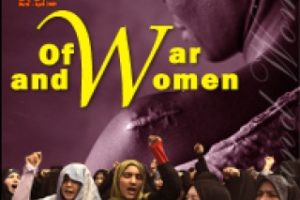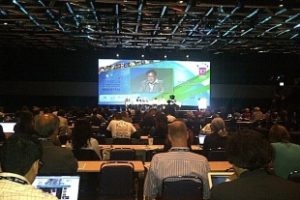Reportage from UNFCCC COP18 in Doha
Climate, Number 3
[[{“type”:”media”,”view_mode”:”media_large”,”fid”:”58″,”attributes”:{“alt”:””,”class”:”media-image”,”height”:”71″,”style”:”font-size: 12px; width: 310px; height: 71px; margin: 10px; float: right;”,”typeof”:”foaf:Image”,”width”:”310″}}]]DOHA, November 30, 2012 — The Subsidiary Body for Implementation (SBI) chair circulated a draft text on the SBI agenda item on “loss and damage” (from climate change) for further discussion and negotiation by country Parties. In the contact group negotiation, country Parties agreed to continue their work on the text while they expressed their concern on few specific paragraphs.
The G77/China group expressed its reservations on paragraph 7, which requests the Subsidiary Body for Scientific and Technological Advice (SBSTA), under the Nairobi work program on impacts, vulnerability and adaptation to climate change, to consider activities aimed at enhancing a relevant knowledge base and information base on the technicalities of loss and damage. It believes that if loss and damage are put under SBSTA then its sprit of implementation under the mandate of SBI will be weakened.
Paragraph 8 of the text asks “the Adaptation Committee to consider the possible ways of increasing coherence and cooperation among existing institutional arrangements and frameworks within and outside of the Convention in addressing loss and damage”. The G77/China emphasized the need for an independent and stand-alone committee to work on the issues of loss and damage, arguing that if loss and damage are considered as issues “beyond adaptation” then it would be logical to form a stand-alone committee.
The group noted that paragraph 9 decides to establish an international mechanism to address loss and damage without any indication of its means of implementation and financial mechanisms. Paragraph 14 requests parties in a position to do so to support the implementation of the work program on loss and damage, which the group argued is against the spirit of the Convention. The group went on to note that the Convention should take necessary measures to ensure financial support for the implementation of the work program, adding that the text gave insufficient emphasis to several key issues like slow onset events, displacement and migration, and territorial loss. It also supported the inclusion of a compensatory mechanism to address loss and damage.
In opposition to the G77/China position, New Zealand welcomed and supported the text. Norway favored inclusion of SBSTA, and the US emphasized the inclusion of other actors, including the private sector and institutions outside the Convention. The EU asked for more time to work on the text before commenting in detail. ###
____________________________________________________________________________
M. Shamsuddoha is the Chief Executive of the Center for Participatory Research and Development-CPRD in Dhaka, Bangladesh.




